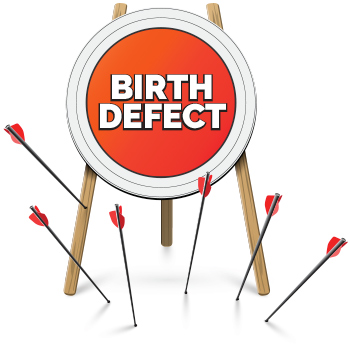
During pregnancy, your OBGYN has a duty to monitor both your maternal health and your baby’s fetal development. Being informed that your developing baby may have a birth defect is news no expectant parent wants to hear, but being informed can help your family take the necessary steps to prepare for the best possible care.
Every 4 1/2 minutes in the United States, a baby with a birth defect is born, with the majority of birth defects occurring before the end of the first trimester, when the brain is still developing. However, most doctors will offer a variety of screening tests throughout pregnancy. Doctors have a duty to care for their patients, including taking the proper steps to screen for and diagnose birth defects, as well as informing parents when a birth defect is possible—even before conception.
The legal and medical team at Janet, Janet & Suggs has over 40 years of experience successfully recovering compensation for patients who have been harmed by medical error. If you believe that your family has experienced negligence due to a doctor’s failure to detect birth defects, contact our attorneys today.
What Are Birth Defects?
A birth defect is a medical problem that develops while a baby is still in the womb. These are generally different from birth injuries, although in some cases they may be related. While some birth defects have clear causes, most of the time the family is left wondering what happened and whether it could have been prevented. Because of the complex nature of these diagnoses, that is a question that will remain unanswered for many families.
What Are Some of the Most Common Birth Defects Caused by Negligence?
Common birth defects caused by medical negligence often result in a lifetime of medical costs as well as severe emotional trauma. Birth defects may result from any number of causes:
- Genetics. Sometimes, mothers and/or fathers may pass on genetic abnormalities to their children, even if they are not affected themselves and are unaware of the possibility.
- Exposure to medications and chemicals. This exposure may be unavoidable or may be the result of simply not knowing about the pregnancy. In any case, it is often difficult to draw a clear line between the cause and its potential impact.
- Infections or illnesses. While most routine health concerns do not affect fetal development, some, such as toxoplasmosis or even a very high fever, can have potentially serious impacts.
In some cases, life-altering birth defects might have been prevented by more careful monitoring of prescription medications, such as Clomid, NSAIDs, Zofran, and others. Counseling patients who are taking potentially dangerous prescription medications on the risks associated with birth defects can help prevent severe traumatic and potentially life-threatening injuries that impact babies:
- Hydrocephaly (also known as hydrocephalus)
- Limb deformities
- Head deformities
- Cerebral palsy
- Cleft palate
- Spina Bifida
- Congenital heart defects
- Down syndrome
- Neural tube defects
- PKU
- Cleft lip
- Gastroschisis
- Craniosynostosis
- Anencephaly
- Microcephaly
How Can the Failure to Detect Birth Defects Result in Medical Malpractice?
Medical malpractice resulting in birth defects can occur in several ways, and by a variety of medical staff. In fact, any medical professional may be found to have been negligent during a pregnancy—this includes lab technicians, nurses, radiologists, doctors, or even the manufacturers of medical equipment.
- Failing to perform an ultrasound properly
- Failing to read an ultrasound properly
- Prescribing dangerous medication during pregnancy
- Performing a diagnostic test incorrectly
- Failing to perform tests or ignoring test results
- Not advising the patient of risks
- Failing to treat prenatal conditions like gestational diabetes
When a medical professional’s actions or inactions appear to have resulted in injuries to your child, contact an experienced personal injury law firm to review your case.
Can I Sue My Doctor for the Failure to Diagnose a Birth Defect?
Evaluating a medical negligence claim is complicated, and proving serious injury is never easy. Successful recovery in a birth defects medical malpractice case involves knowing how to investigate, evaluate medical records, and ask the right questions to determine what happened.
Birth-related malpractice lawsuits typically fall under three categories:
- Birth injury. While birth injuries may occur separate from birth defects, some birth defects do make the birthing process more difficult. This can result in a number of dangerous situations for both mother and child, such as delayed C-section, brain damage, cerebral palsy, hypoxic ischemic encephalopathy (HIE), and others.
- Wrongful birth. Sometimes, parents make the difficult decision to not continue with a pregnancy upon the detection of a severe birth defect because of the emotional, physical, and financial consequences associated with the detected disorder. When a parent makes a legal claim that they would have elected not to continue the pregnancy had they known about the defect, this is called a wrongful birth claim.
- Wrongful pregnancy. In some cases, parents-to-be might be good candidates for preconception carrier screenings—tests that determine if potential parents are carriers for some common genetic disorders. While not everyone decides that these kinds of tests are in their best interest, some parents of a child with birth defects who might have decided to have the tests done, had they been offered, may decide to move forward with a wrongful pregnancy lawsuit.
Each of these types of birth-related lawsuits comes with its own rules, but if you have concerns about your individual situation, a consultation with a medical malpractice attorney can help you better understand your rights.
Why Choose Janet, Janet & Suggs for Your Failure to Detect Birth Defects Medical Malpractice Case
JJS has successfully represented those harmed by medical malpractice nationwide, holding negligent medical professionals accountable for their actions. Because we believe in the cases we take on our firm operates on a contingency fee basis, which means we do not collect payment from you until your case is won. If you believe that you may need to speak to an attorney about harm caused to your family because of your OBGYN’s failure to detect a birth defect, contact JJS today to schedule a free consultation.

Reviewed by:
Claire Surles, RN
Registered Nurse
Claire comes to JJS after a 10-year career as a labor and delivery nurse. She dedicated her hospital efforts to advocating for families, providing the safest birthing environment possible as Newborn Admission Nurse at UMMC St. Joseph Medical Center in Towson, Maryland. Her passion for helping those who experienced losses at any stage of gestation led to her appointment as Coordinator of the hospital’s ROOTS perinatal loss program. READ FULL BIO
